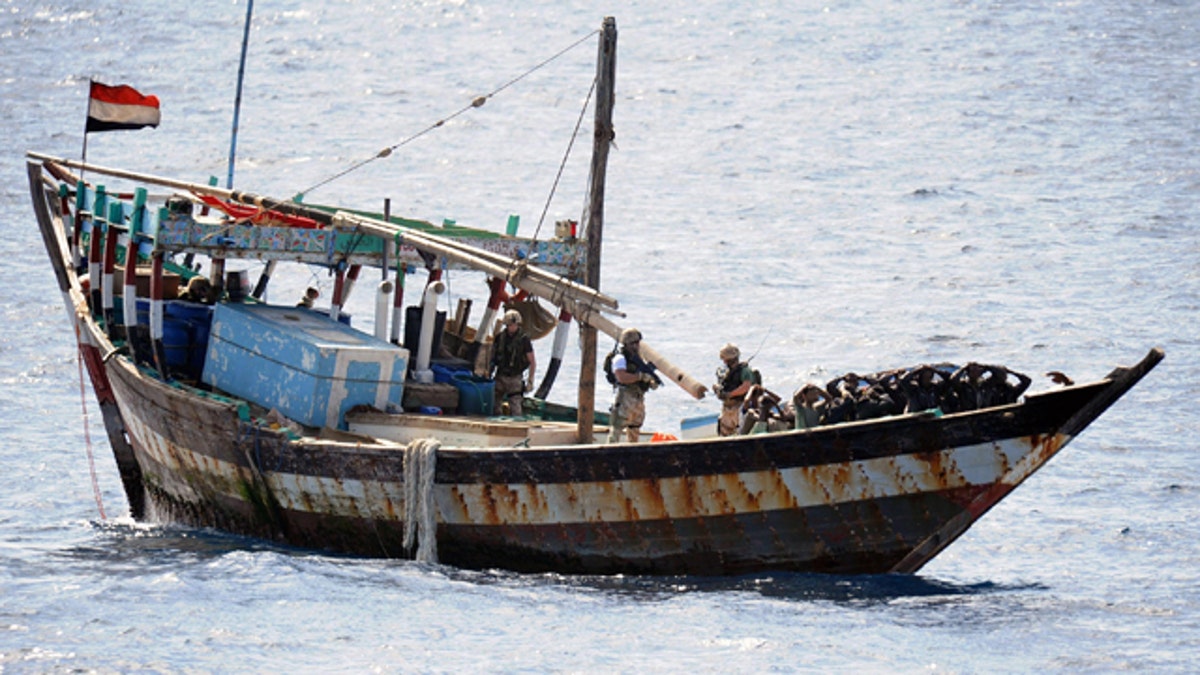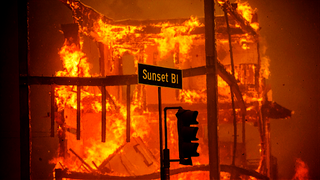
In this image made available by the Ministry of Defense in London, Thursday Feb. 16, 2011, a naval boarding party from HMS Cornwall guard Somali pirates after their dhow was boarded in the Indian Ocean on Thursday Feb. 10, 2011. (AP)
NAIROBI, Kenya – The first time John Rodriguez tried to sail around the world a hurricane sunk his boat. His second attempt failed because of a scourge bedeviling mariners in the Indian Ocean, the Arabian Sea and the Gulf of Aden: pirates.
Rodriguez is among thousands of sailors who once steered their yachts across the warm Indian Ocean without a second thought, but are now rerouting, hiring replacement crews, packing their boats aboard cargo ships and contracting armed guards, or canceling their dream voyages altogether.
With Somali pirates seizing vessels and killing hostages in an area as vast as the continental United States, boatyards, restaurants and other establishments among the yachters' routes have seen business fall, with some of their customer base scared off.
Rodriguez, a 44-year-old Briton, sailed from his homeland to Florida with his wife and two children. But the family didn't push on through the Panama Canal. They knew their around-the-world route would eventually take them past waters infested by Somali pirates, who in 2009 kidnapped a British yachting couple, the Chandlers, near the Seychelles and held them for 388 days under often brutal conditions.
"We bought our charts the day before the Chandlers got taken," Rodriguez said. "Three months of angst followed while we tried to decide what to do ... it's an enormous effort to do a trip like that and you don't get the opportunity very often."
Somali pirates killed four American yachters last month and kidnapped a Danish family aboard their 43-foot sailboat last week. A South African couple taken off their sailboat in October are still being held.
The European Union Naval Force has done its best to warn yachters of the danger, said spokesman Wing Cmdr. Paddy O'Kennedy. But from their blog posts, it appeared the Danes felt safe enough because of the presence of warships on antipiracy patrol in the area.
"The latest attacks have certainly changed the game completely," said Paul Gelder, the editor of Yachting Monthly.
In posts on the magazine's web site forum Scuttlebutt, worried sailors discuss canceled or rerouted plans and trade frightening stories of witnessing attacks.
Yachts trying to sail from Asia to Europe through the Suez Canal face tough choices. They can't sail in the other direction because the winds aren't right. Bigger yachts can go around the southern tip of Africa, but the Cape of Good Hope is notorious for storms and shipwrecks.
For those who live aboard their boats and want to get home, few choices remain: shell out big money to ship home their yacht or hire guards — or run the Somali gauntlet.
Over the past six months, Peters & May Ltd., a company that specializes in shipping boats and yachts, has seen a roughly 300 percent increase in inquiries from captains interested in shipping their vessels rather than risking going through pirate-infested waters, said managing director Angus Bruce Jones.
Another option is to use a company like Naval Guards, a private security outfit based in Britain whose guards escort vessels on speedboats. They sent their first of three boats to the region in September, and are now working at full capacity, said chief of operations Thomas Jakobsson.
On Wednesday, six Naval Guards employees fought off six pirates who had attacked and boarded the Capricorn, a yacht crewed by a Dutch couple, Jakobsson said.
But some yacht owners can't or won't pay for expensive shipping or guards. Instead, they might hire a crew to take the risk for them, said Mat Sandys-Winsch of Direct Yacht Deliveries. His company used to sail three or four yachts a year through the Indian Ocean to deliver to owners who would meet them in the Mediterranean. But since Christmas, the company has suspended sailing between India and the Suez Canal because of pirates.
"The attacks had spread north to the Omani coast. They had basically blocked off the route we were taking," he said, adding that many in the yachting community don't take pirates seriously enough.
"The feeling is that it is a big wide ocean and no one can touch you," Sandys-Winsch said. "That's not true,"
Rene Tiemessem, who is organizing a rally from Thailand to Turkey, said the people on his convoy through the Indian Ocean live on their yachts and don't have the spare cash for guards or shipping.
He's asked for an escort from the international warships fighting piracy off East Africa. But the only vessels who get those are the ones delivering food aid to war-ravaged Somalia, whose lawless shores are dotted with pirate camps. Navies say they are too thinly stretched already to start escorting everyone.
"There's no alternative for us" than to sail this route, he said. "People feel abandoned."
With many yachtsmen abandoning the region altogether, industries dependent on the routes are being devastated.
At Kilifi Boatyard in Kenya, Peter Bateman has laid off half his permanent staff. Ten years ago, they'd see more than a dozen yachts come in needing repairs, paint and other work. This year, not one. Out of 20 yachts considering coming here from the Chagos islands in the Indian Ocean this year, he said, 17 had turned around and gone back to Asia and three had gone around South Africa.
The tiny island nation of the Seychelles, a favorite with yachters, has seen tourism revenue drop by 15 percent, while fisheries, shipping and fuel sales to boats are all down by 30 percent or more, its Foreign Ministry said.
Blue Water Rallies, which organized the sailing rally attended by the four Americans before they peeled off and were captured and executed as American warships trailed the seized yacht, has canceled its next rally because of the poor economic climate and fears over pirate attacks, said Blue Water director Richard Bolt, who knew the four Americans.
As the hotels, restaurants and businesses among the yachters' sun-drenched route scan the empty waves expectantly, Rodriguez and his family are back in chilly, overcast England. Abandoning their dream journey was an awful decision, he said, and he was full of regret.
But with every day that passes, and every new attack, he sees that there are many things worse than regret.








































